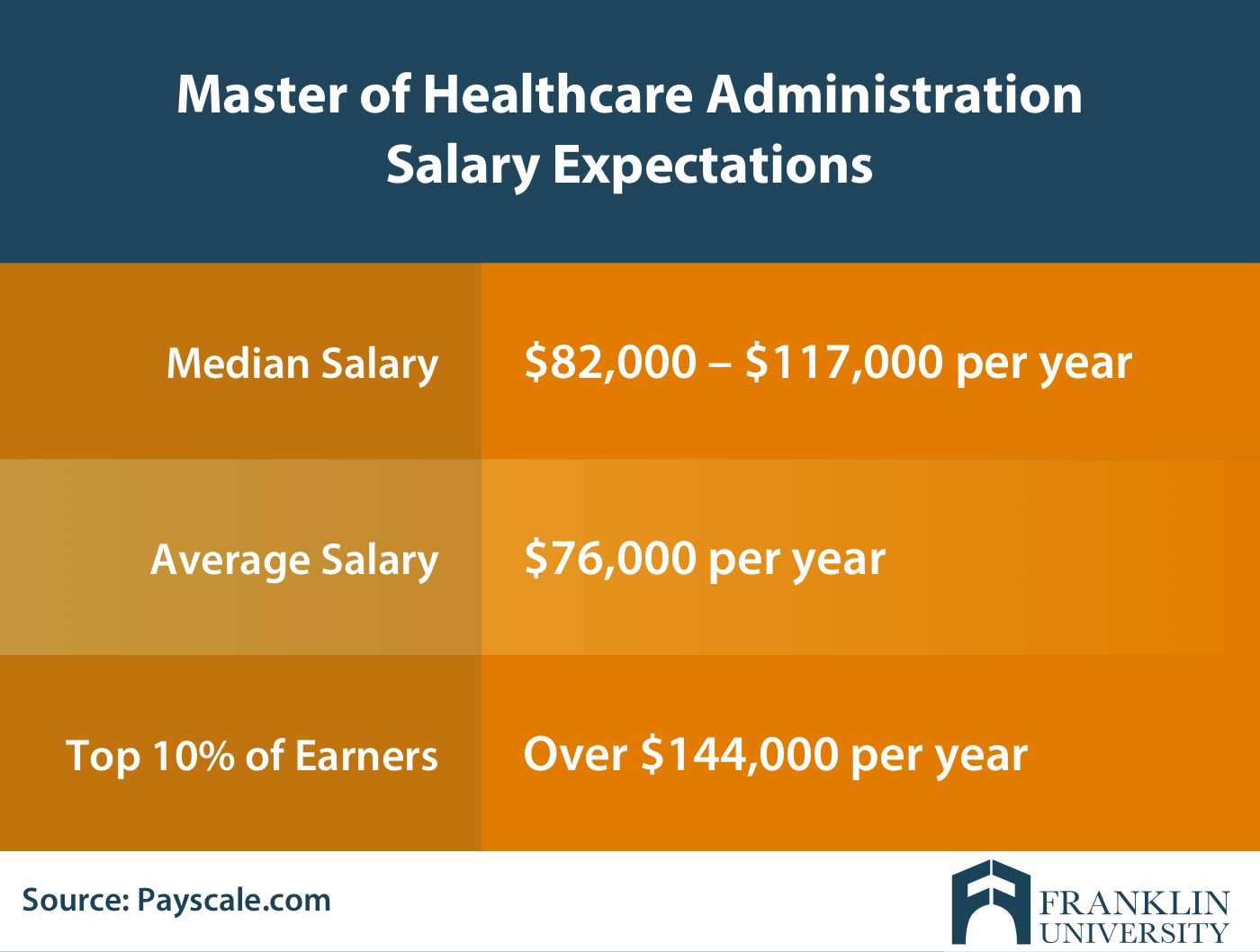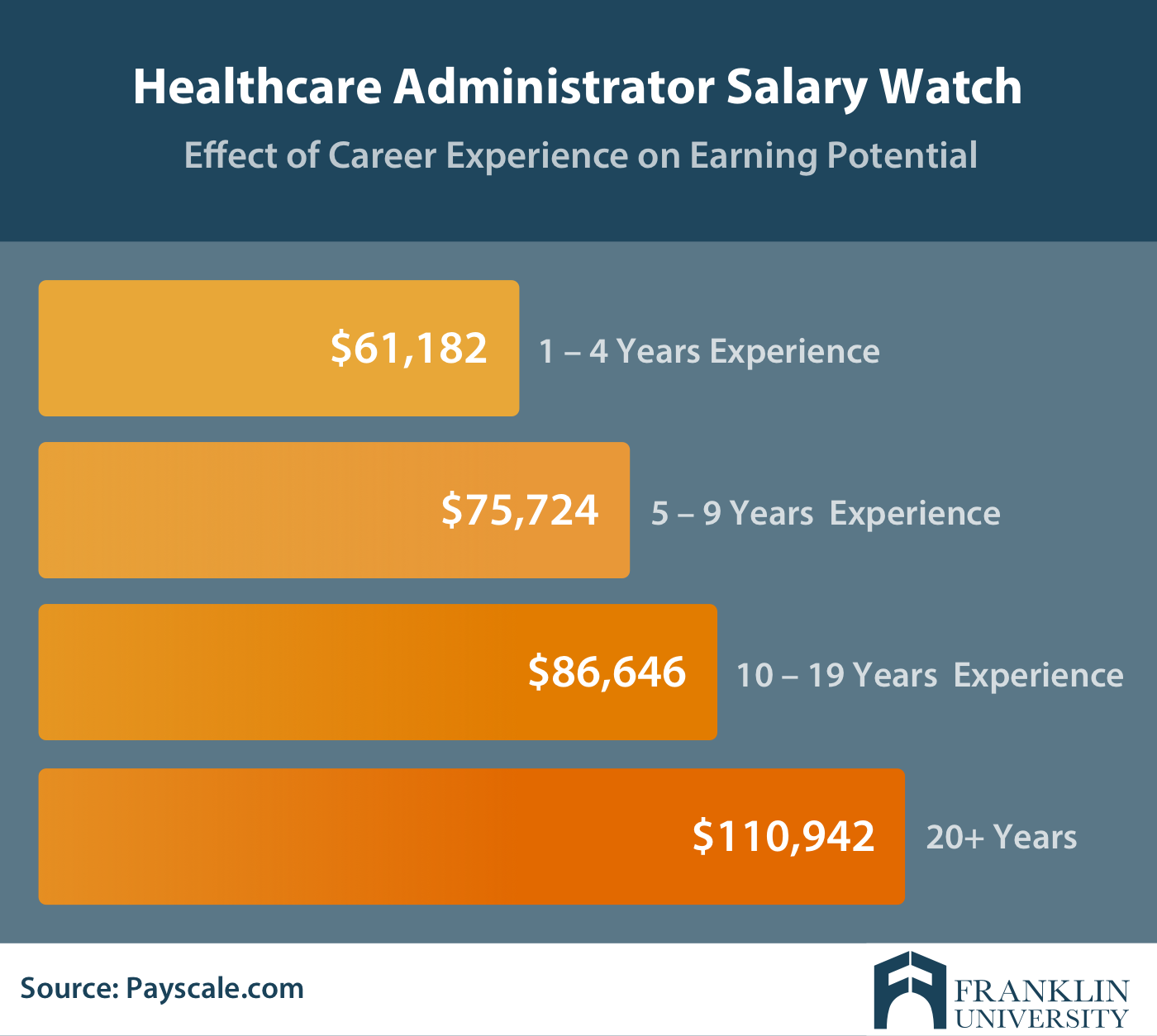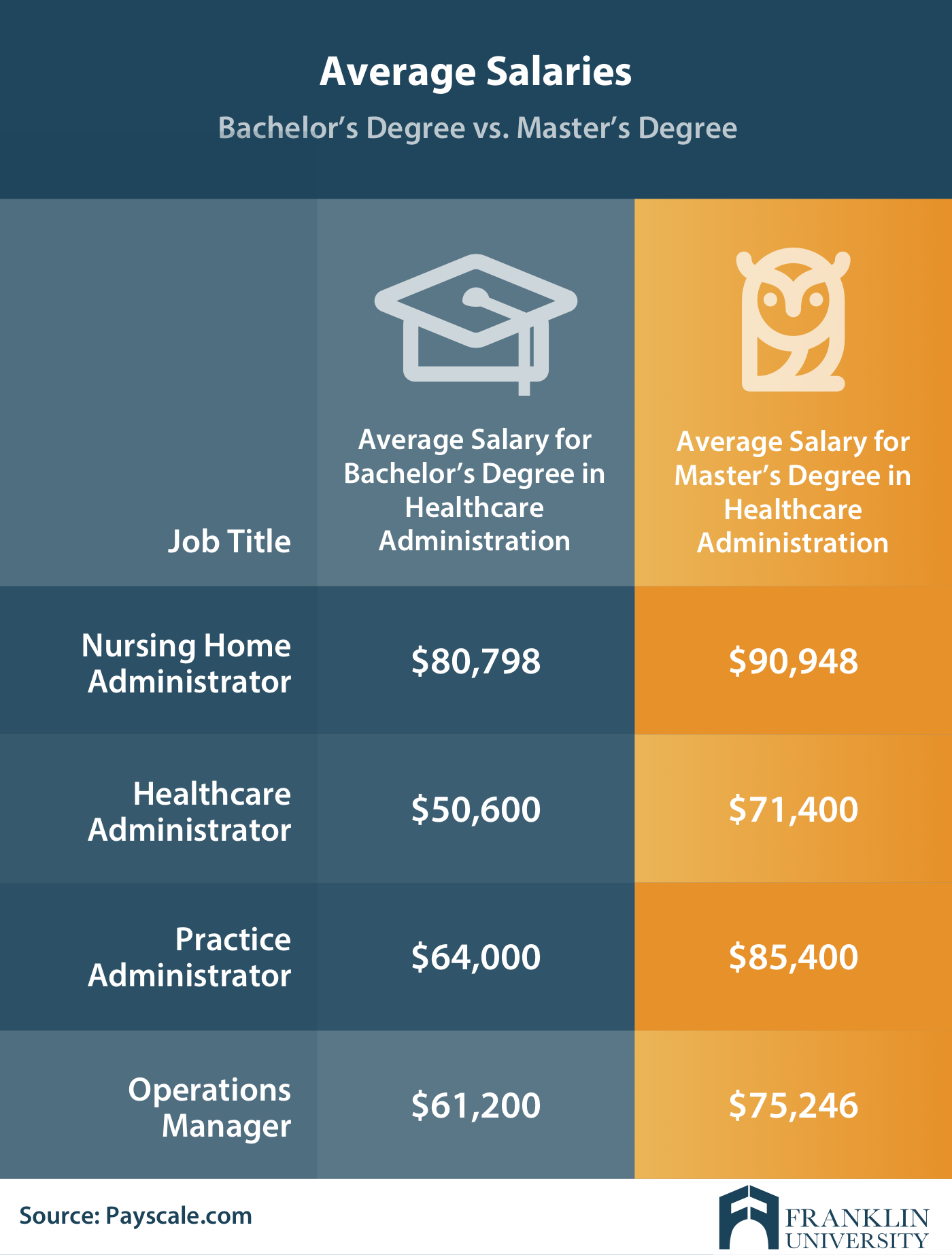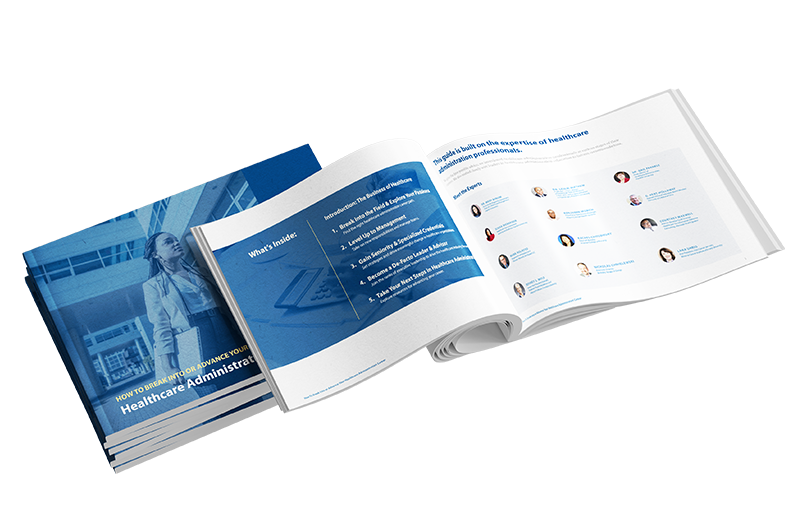Request Information
We're Sorry
There was an unexpected error with the form (your web browser was unable to retrieve some required data from our servers). This kind of error may occur if you have temporarily lost your internet connection. If you're able to verify that your internet connection is stable and the error persists, the Franklin University Help Desk is available to assist you at helpdesk@franklin.edu, 614.947.6682 (local), or 1.866.435.7006 (toll free).
Just a moment while we process your submission.

What is the Average Master in Healthcare Administration Salary?
Healthcare administration is a rapidly growing field. As the large baby-boom population ages and remains active longer, the need for healthcare professionals at all levels is expected to grow significantly. According to the Bureau of Labor Statistics, the growth for medical and health services managers will increase by 20% by 2026.
As the field grows, the competition for these well-paying jobs is also likely to increase. So how can you give yourself an edge?
Pursuing a Master of Healthcare Administration (MHA)
A Master of Healthcare Administration (MHA) degree program can help you gain the knowledge and skills needed to secure leadership positions in the healthcare industry. An MHA will prepare you for advanced roles in healthcare administration, including consultant, hospital or health services organization leader or as a change agent in public health.
In a typical MHA program you’ll learn to:
- Recognize and articulate facts, concepts and procedures related to healthcare administration theories and practices.
- Integrate healthcare administration theories, principles and practices for future application.
- Systematically apply communication, technical, analytical knowledge and critical thinking skills to administrative and clinical healthcare problem-solving.
- Evaluate the effectiveness of planning, development and implementation of healthcare administrative solutions.
- Design and create solutions to address societal, cultural and environmental healthcare issues.
Whether you’re looking to advance your career or change roles, an MHA can be a path to achieving your goals. However, a master’s degree is a significant undertaking. Even online and flexible degree options require time, dedication and hard work to excel.
Advance your career in Healthcare Administration while you advance patient care. Download your free career guide.
So is getting your MHA worth it? And how can an MHA impact your earning potential?
What Are the Salary Expectations for Master of Healthcare Administration Graduates?
While many people are motivated by the high earning potential of a career in healthcare administration, there’s no simple answer for how much you can expect to make. While there’s no one-size-fits-all salary, let’s take a look at some of the overarching data for graduates of MHA programs.

With median salaries starting at $82,000 and the top 10% of earners can earn over $144,000 per year, how can we narrow in on what salary you might expect? What else impacts the earning potential of MHA graduates? Let’s look at other factors that influence salaries in the healthcare administration field.
What Influences Earning Potential of Healthcare Administrators?
Healthcare administrator is an umbrella term for a vast number of careers. Therefore, earning your Master of Healthcare Administration (MHA) is only one piece of the puzzle when it comes to understanding salary expectations. Here are some of the other factors that will contribute to how much you can make with an MHA degree.
Healthcare Setting and Size of Practice
An MHA is a versatile degree that provides a broad base of knowledge, preparing you to work in a variety of settings. Depending on your career aspirations, you may want to work in the public, private or government sector.
Here are some more specific examples of settings in which healthcare administrators work.
- Private and group medical practices: Ranging from individual family practices to large physicians collaboratives.
- Public health organizations: Examples include the Centers for Disease Control (CDC), the World Health Organization or state health agencies and departments.
- Nonprofits: Including international aid organizations and advocacy groups who do everything from improving public health standards to combatting crises around the world.
- Hospitals and hospital systems: Ranging from for-profit to nonprofit and small private hospitals to large public hospital systems.
- Government agencies: Like the Food and Drug Administration (FDA), Medicare and Medicaid Services or Veterans Affairs.
- Pharmaceutical and device manufacturers: Companies that develop new medical equipment and treatments for a range of illnesses, disabilities and health challenges.
As you can see, the career possibilities stretch far and wide within the healthcare industry. Not only will your chosen sector influence your salary, the size of the organization and its resources will also be a factor. With smaller organizations often come smaller budgets, and for-profit companies may overshadow their nonprofit peers when it comes to offering higher salaries.
However, you must also weigh the non-monetary aspects of your job and the rewards that come with it in addition to considering financial compensation.
Job Skills and Industry Experience
As with any job, your years of experience and job-related skills play a large role in determining your salary and opportunities for advancement. Salaries for healthcare administrators with up to four years of experience average $61,182 per year and can increase to an average of $110,942 with 20+ years on the job. This table shows the complete view of how salary expectations increase with years of experience.

Not only does on-the-job experience play a role in pay, so do job responsibilities and skills. Your previous roles may have required you to undergo specific training or certifications that can set you apart from other candidates when it comes to advancement opportunities.
Job Title and Function
Another determination for salary is the career path you choose. An MHA degree will prepare you to work in health services and medical management where you’re responsible for directing, planning and coordinating healthcare services.
At a high level, professionals in this field work to manage facilities, clinical areas and medical practices. These responsibilities describe a large number of jobs. Let’s take a closer look into specific job functions and the salaries associated with them.
These examples just begin to show the differences in earning potential based on job function. If you’re interested in roles outside of these examples, you can research specific data for the jobs you want to pursue.
How Does Earning a Master of Healthcare Administration Affect Compensation?
Earning your Master of Healthcare Administration can significantly increase your earning potential in comparison to only obtaining a bachelor’s degree. Let’s look at a one-to-one comparison for salaries with a bachelor’s degree versus a master’s degree.

An MHA can also be a key differentiator or a minimum qualification for certain jobs in the healthcare field. Without a master’s degree, your salary expectations and advancement opportunities may plateau over time.
For many leadership positions, employers favor candidates with master’s degrees and in-depth industry experience, believing they’re most qualified to generate innovative ideas and bottom-line results—without sacrificing quality of care.
Choosing the Right Master of Healthcare Administration Degree Program
The healthcare industry needs qualified leaders to navigate a complex and ever-evolving environment. A Master of Healthcare Administration will prepare you to meet these challenges, while helping you advance your career and increase your salary expectations.
If you’re ready to pursue your Master of Healthcare Administration as the next step in your career, you need to find a program that meets your needs. For many professionals, taking time to attend an on-site degree program isn’t feasible. A flexible, online degree program can be the answer to advancing your education without taking time away from your career.
Furthering your education will require time and dedication, but the return on investment can be worthwhile for your financial future. It can also lead to rewarding opportunities that not only make a difference in healthcare organizations, but also in the lives of patients.
Take your next steps by exploring the Franklin University Master of Healthcare Administration.





